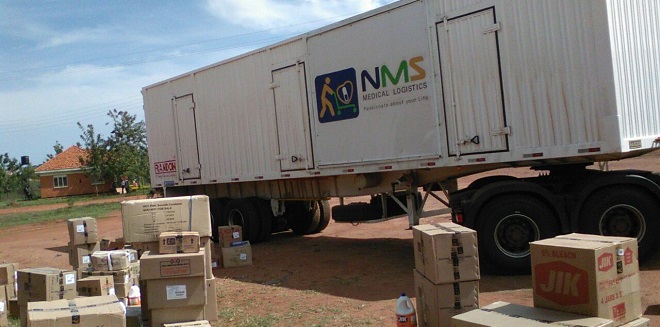
Kampala, Uganda | THE INDEPENDENT | A Ministry of Health plan to destroy over 1,200 tons of drugs they say have expired, has met stiff resistance from Ugandan Civil Society.
Without giving specifics what particular drugs are to be burnt, Permanent Secretary Diana Atwiine told journalists on Feb.12 that the drugs were collected from over 6500 health centers across the country.
Atwiine said they are choosing to get rid of the medicines which can be dispensed by unscrupulous people if they keep in the facilities longer. She added that they also need space in the hospitals for restocking new medicine that can be used.
This however comes at the time when people across the country are complaining about the continuous lack of the drugs at government health facilities whereby whenever they go to these centers doctors only examine them and give them notes to buy drugs from private pharmacies and drug shops.
CSOs to petition
The Members of the Civil Society Movement are also unhappy with the ministry’s plans and methods and are set to petition the parliamentary committees on budget and health to ensure better drug management in the country.
Addressing journalists on Friday, the Civil Society Organizations (CSOs) under their umbrella body, the Civil Society Budget Advocacy Group (CSBAG) expressed concern over the move by the government to destroy drugs amidst shortage of essential medicines and health supplies in public health facilities.
“We as Civil society, today seek answers to questions concerning this exercise. We would like to know the total cost in monetary terms, required to destroy these expired drugs with a clear categorization of the donor and tax payers’ money,” Julius Mukunda, the Executive Director CSBAG said.
According to the CSOs, the government has over the years faced challenges of drug stock-outs at health centers, especially the tracer medicines which include anti-malarials, cotrimoxale, measles vaccine, sulphadoxine/pyramethamine, Depoprovera and Oral Rehydration salts. (ORS). They noted that drug stock-out, is still a growing problem in the health sector with the National Medical Stores (NMS) being unable to provide essential medicines in health centres including hospitals and clinics.
Auditor General’s report
In 2016, the Auditor General’s report indicated that mama kits were out of stock for 320 days and coartem for 285 days at sampled health facilities, mainly due to failure of NMS to supply drugs in the quantities requested by the health centers and lack of reliable information on drug usage.
“In a sector which is still ill financed, who procures these drugs that Ugandans don’t need? This is very saddening in a situation where people are dying of malaria and there are no drugs.” John Mark Agong, the budget policy specialist CSBAG, said.
Accountability
To avoid wastage, the CSOs, have tasked the government to issue a list of health centres that are affected, and a breakdown of drugs that have been lined up for destruction.
“The ministry should prepare a list for the affected health centres, and the number of drugs to be collected from each. We would like to know the affected health centres where the drugs will be collected,” Mukunda said.
Sophie Nampewo, the budget policy specialist CSBAG added; “The ministry should give us a breakdown of the drugs which are given to health centers and they are not used.” In her communication about the expired drugs recently, the permanent secretary Atwine, noted that the expired drugs and health supplies, will be destroyed from 6,619 health centers, to create space for adequate storage of medicines and other health supplies.
The CSOs also questioned whether the drugs supplied are for the diseases that are not affected by the intended recipients.
“Are the patients not able to access these drugs and therefore expire in the health center stores? The categorization of these drugs is essential as it guides on the future supply of drugs to the respective health centers based on the commonly diagnosed diseases in the area.” Mukunda said.
According to the CSOs, destruction of drugs, is a sign of poor planning as it easily implies that the NMS procures drugs with a short shelf life. The CSOs want the ministry to explain how much it will cost the government to destroy the expired drugs, and how much the same drugs cost in procurement.
Solutions
The CSOs want the government to put in place, a drug tracking system, to keep track of the drug usage and shelf life. “Incineration of drugs is common, but not to this magnitude. It is massive wastage destroying such volumes of drugs amidst shortage. We call upon government to strengthen its monitoring systems,” Kenneth Mwehongo, a member of CSBAG said.
****
SOURCE: CSBAG NEWSLETTER
RELATED
Expired drugs; who is to blame? https://t.co/qwSrQLNMUW pic.twitter.com/rMO12Ug2Fk
— The Independent (@UGIndependent) March 6, 2018
 The Independent Uganda: You get the Truth we Pay the Price
The Independent Uganda: You get the Truth we Pay the Price


